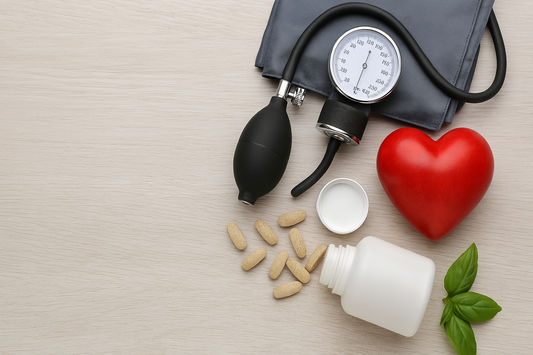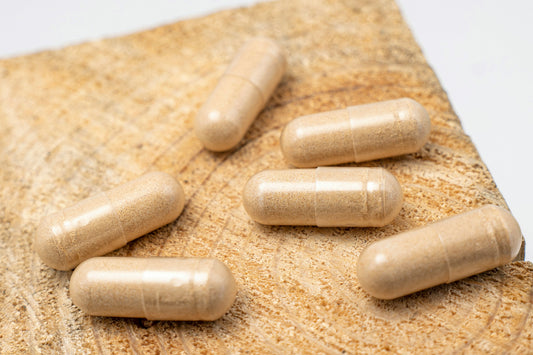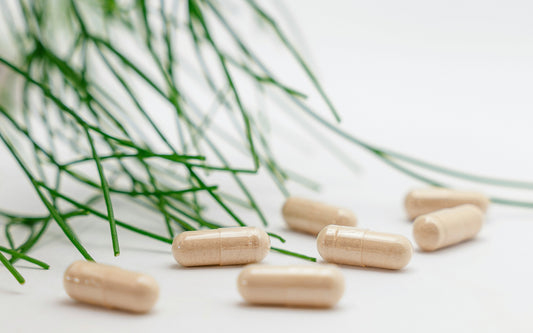Discover Natural Blood Pressure Remedies for Healthy Living
High blood pressure is a common condition that affects millions of people worldwide. While medication is often prescribed to manage the condition, there are also natural remedies that can help lower blood pressure. By making simple lifestyle changes, such as losing weight, exercising regularly, and eating a healthy diet, you can effectively control your blood pressure without medication.
Key Takeaways:
- There are natural remedies available for lowering blood pressure
- Simple lifestyle changes can have a significant impact on blood pressure
- Weight loss, regular exercise, and a healthy diet are key for managing blood pressure naturally
- Consult with a healthcare provider before making any significant changes to your routine
- Natural remedies can reduce the risk of heart disease
Lifestyle Changes for Lowering Blood Pressure
Managing high blood pressure requires making necessary lifestyle changes. By incorporating these changes into your daily routine, you can effectively reduce your blood pressure naturally and improve your overall health.
1. Maintain a Healthy Weight
Excess weight puts additional strain on your heart and blood vessels, leading to higher blood pressure. Losing weight and maintaining a healthy weight can significantly lower your blood pressure. Aim for a body mass index (BMI) within the normal range and consult with a healthcare professional for guidance on a healthy weight loss plan.
2. Engage in Regular Exercise
Regular physical activity is crucial for managing high blood pressure. Engaging in aerobic exercises, such as walking, cycling, or swimming, can help lower blood pressure by 5 to 8 mm Hg. Strength training exercises, such as lifting weights, can also have a positive impact on blood pressure. Aim for at least 30 minutes of moderate exercise most days of the week.
3. Follow a Healthy Diet
Adopting a healthy eating plan can have a significant impact on blood pressure. Reduce your sodium intake by avoiding processed foods and opting for fresh, whole foods instead. Include plenty of fruits, vegetables, whole grains, and lean proteins in your diet. Additionally, incorporate potassium-rich foods, such as bananas, oranges, and avocados, as they can help lower blood pressure.
4. Manage Stress Levels
Chronic stress can contribute to high blood pressure. Finding effective stress management techniques is crucial. Consider engaging in activities like meditation, deep breathing exercises, and yoga to reduce stress levels. Creating a relaxing sleep environment and seeking support from friends and family can also help in managing stress and maintaining healthy blood pressure levels.
- Maintain a healthy weight
- Engage in regular exercise
- Follow a healthy diet
- Manage stress levels
By incorporating these lifestyle changes, you can effectively lower your blood pressure, reduce the risk of heart disease, and improve your overall well-being. It is important to note that these lifestyle changes may take time to show results, and it is advisable to consult with a healthcare professional for personalized guidance and monitoring.
Dietary Changes for Managing Blood Pressure

Paying attention to your diet can have a significant impact on your blood pressure. Incorporating herbs, such as garlic, basil, and cinnamon, into your meals can help lower blood pressure. Consuming foods rich in potassium, such as bananas, oranges, and avocados, can also have a positive effect. Additionally, reducing your intake of processed foods, which are often high in sodium, can help lower blood pressure.
When it comes to managing blood pressure naturally, herbs have been found to be beneficial. Garlic, for example, contains compounds that can help relax blood vessels and reduce blood pressure. Basil and cinnamon are also known for their potential to lower blood pressure. Consider adding these herbs to your meals or incorporating them into your cooking to reap their benefits.
Incorporating potassium-rich foods into your diet can also help in controlling blood pressure. Bananas, oranges, avocados, and other potassium-packed foods can help balance the levels of sodium in your body and reduce the risk of high blood pressure. Furthermore, reducing your consumption of processed foods, which are typically high in sodium, can have a positive effect on your blood pressure levels.
Remember, making dietary changes is just one aspect of managing blood pressure naturally. It is important to consult with a healthcare provider before making any significant changes to your routine and to ensure that these dietary changes align with your overall health goals.
Exercise as a Natural Blood Pressure Remedy
Exercise is a powerful natural remedy for managing high blood pressure. Engaging in regular physical activity can have a significant impact on lowering blood pressure levels. Aerobic exercises, such as walking, jogging, or swimming, can help lower blood pressure by approximately 5 to 8 mm Hg. Strength training exercises, such as lifting weights, can also contribute to reducing blood pressure.
When it comes to managing blood pressure through exercise, consistency is key. Aim for at least 30 minutes of moderate physical activity every day. This can be broken down into shorter sessions throughout the day if needed. Remember to choose activities that you enjoy and that are appropriate for your fitness level to maintain motivation and adherence.
In addition to lowering blood pressure, regular exercise offers numerous other benefits for overall health and well-being. It can help with weight management, improve cardiovascular health, increase energy levels, and reduce stress. By incorporating exercise into your daily routine, you can take an active role in managing your blood pressure naturally and promoting a healthy lifestyle.
Stress Reduction Techniques for Blood Pressure Management

Chronic stress can have a negative impact on blood pressure levels. Therefore, it is crucial to find effective ways to manage stress for better blood pressure control. Here are some natural stress reduction techniques that can help:
- Meditation: Taking a few minutes each day to practice meditation can have a calming effect on the mind and body. Deep breathing exercises and focusing on the present moment can help reduce stress and lower blood pressure.
- Yoga: Engaging in yoga poses and stretching exercises can help release tension in the body and promote relaxation. The combination of physical movement, breath control, and mindfulness can be beneficial in managing stress and maintaining healthy blood pressure levels.
- Engaging in enjoyable activities: Participating in activities that bring joy and happiness can help alleviate stress. Whether it's spending time in nature, pursuing hobbies, or connecting with loved ones, finding time for enjoyable activities is essential for stress reduction.
- Creating a relaxing sleep environment: Getting enough quality sleep is crucial for managing stress and maintaining overall health. Creating a calming sleep environment, such as keeping the bedroom dark and quiet, can promote restful sleep and reduce stress levels.
- Seeking support: Building a strong support system can provide emotional assistance during times of stress. Sharing thoughts and feelings with trusted friends and family members can help alleviate stress and contribute to better blood pressure management.
By incorporating these stress reduction techniques into your daily routine, you can effectively manage stress levels and support healthy blood pressure control. Remember, it is important to consult with a healthcare provider for personalized advice and guidance tailored to your specific needs.
Other Natural Remedies for High Blood Pressure
In addition to lifestyle changes, there are several other natural remedies that can help lower blood pressure. These alternative treatments can be used in conjunction with traditional approaches to manage this condition effectively. Here are some natural remedies for high blood pressure:
Dietary Supplements
- Dark chocolate: Some studies suggest that consuming dark chocolate, which is rich in flavonoids, can help relax blood vessels and lower blood pressure. However, moderation is key, as excessive consumption can lead to weight gain and other health issues.
- Calcium: Getting enough calcium through diet or supplements may have a positive impact on blood pressure. Calcium helps relax blood vessels and improves their ability to expand, reducing blood pressure levels. It is important to consult with a healthcare provider to ensure the right dosage for your specific needs.
Herbal Remedies
- Hawthorn: Hawthorn is a popular herb used in traditional medicine to support heart health and manage high blood pressure. It works by improving blood flow and reducing resistance in the blood vessels.
- Ginger: Ginger has been shown to have potential blood pressure-lowering effects. It can help relax blood vessels and improve blood circulation, contributing to lower blood pressure levels.
While these natural remedies show promise, it is essential to remember that they should not replace medical treatment or prescribed medications. Always consult with a healthcare provider before adding any herbal supplements or making significant changes to your routine. They will be able to provide personalized guidance based on your specific health needs and ensure the most effective approach to managing high blood pressure.
Conclusion
Managing high blood pressure is crucial for promoting a healthy lifestyle. By implementing natural remedies and making necessary lifestyle changes, you can effectively control your blood pressure and reduce the risk of heart disease. Remember to consult with a healthcare provider before making any significant changes to your routine.
Through simple adjustments, such as losing weight, exercising regularly, and adopting a healthy diet, you can naturally lower your blood pressure. Incorporating herbs like garlic, basil, and cinnamon into your meals can provide additional benefits, along with consuming potassium-rich foods like bananas, oranges, and avocados. By reducing your intake of processed foods high in sodium, you can further support your blood pressure management.
In addition to these lifestyle modifications, incorporating regular exercise into your routine is essential for lowering blood pressure. Engaging in aerobic activities and strength training exercises can have a positive impact. Furthermore, it's important to address stress levels through practices like meditation, deep breathing, and engaging in enjoyable activities.
While exploring natural remedies such as dark chocolate and calcium supplements, it's essential to consult with a healthcare provider to ensure their suitability for your specific circumstances. By taking these various steps, you can effectively manage your blood pressure and enjoy a healthier life.
FAQ
Can lifestyle changes effectively lower blood pressure?
Yes, making simple lifestyle changes such as losing weight, exercising regularly, and eating a healthy diet can effectively control blood pressure without medication.
How can dietary changes help manage high blood pressure?
Incorporating herbs into meals, consuming foods rich in potassium, and reducing processed food intake can have a positive impact on blood pressure.
What role does exercise play in lowering blood pressure?
Regular exercise, including aerobic activities and strength training, can help lower blood pressure by about 5 to 8 mm Hg.
What are some stress reduction techniques for managing blood pressure?
Practices such as meditation, deep breathing, yoga, engaging in enjoyable activities, creating a relaxing sleep environment, and seeking support from friends and family can help reduce stress levels and lower blood pressure.
Are there any other natural remedies for high blood pressure?
Some studies suggest that consuming dark chocolate and getting enough calcium through diet or supplements may have a positive impact on blood pressure. However, it is important to consult with a healthcare provider before adding any herbal supplements to your routine.






